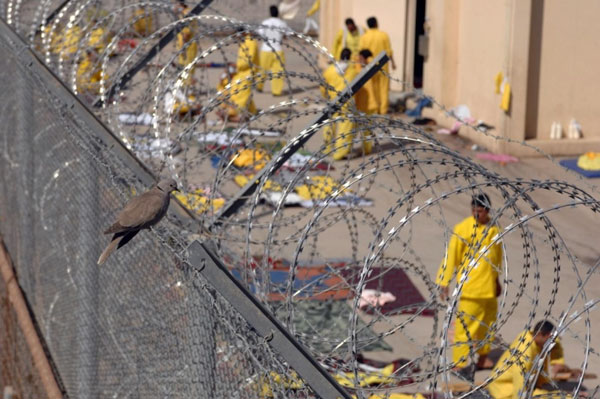Sunday Times 2
Torture wasn’t the sole monopoly of repressive regimes
View(s):By Thalif Deen
UNITED NATIONS (IDN) – According to a joke that was circulating in Washington political circles in a bygone era, Iraqi President Saddam Hussein’s notorious torture chamber in the Abu Ghraib prison in Baghdad — once held up as a symbol of barbarity — was never shut down.
After the US invasion and occupation of the country (2003- 2011), a signboard outside the prison chamber apparently read: “Under New Management.”

Abu Ghraib Prison, Iraq. Credit: Pentagon
The extent of the US administration’s embarrassment following the publication of photos showing torture and abuse of Iraqi detainees in Abu Ghraib was evident in the fact that Washington postponed the release of the State Department’s annual report on human rights abuses worldwide.
But the official reasons for the eleventh-hour postponement were not disclosed.
The report, usually takes aim at virtually every country, focusing mostly on authoritarian regimes, for human rights excesses while excluding US abuses from its pages.
The question that was usually asked: can Washington afford to take a holier-than-thou attitude when it beats up the rest of the world every year in its annual report?
Even the ‘New York Times’ admitted in its editorial that “the United States has been humiliated” to a point where government officials could not release the year’s international human rights report “for fear of being scoffed at by the rest of the world.”
In 2005, The New York Times obtained a 2,000-page US Army report concerning the homicides of two unarmed civilian Afghan prisoners by U.S. armed forces in 2002 at the Bagram Theater Internment Facility.
The prisoners, Habibullah and Dilawar, were chained to the ceiling and beaten, which caused their deaths — proving that torture was not the sole monopoly of authoritarian regimes, including Iraq, Syria, Afghanistan, Libya, and Saudi Arabia, among others.
Fast forward to 2022.
A new UN report released December 22 said a functional and independent preventive mechanism, at national and international levels, that can regularly visit all detention facilities is vital to protect more than 10 million people detained worldwide from torture and ill-treatment,
The study, authored by the UN torture prevention body on the occasion of the 20th anniversary of the adoption of the Optional Protocol to the Convention against Torture (OPCAT), says an innovative and proactive way of preventing torture based on regular visits to detention places by international and national bodies was established 20 years ago.
The OPCAT, adopted by the General Assembly of the United Nations in December 2002, established the Subcommittee on Prevention of Torture (SPT).
Since it began to work in 2007, the SPT has visited more than 60 of the 91 States parties to this preventive system in more than 80 missions.
Among these missions, the SPT delegations visited “self-ruled prisons controlled by inmates in Ecuador and Mexico”, where grave violence occurred.
SPT members also examined high-security prisons in several countries, including Brazil, Guatemala, Cambodia, and the United Kingdom.
In addition, SPT delegations monitored how migrants were detained in closed camps in Nauru, Türkiye, Cyprus, and Italy, and examined psychiatric hospitals during all the visits.
In 2023, the SPT plans to visit Croatia, Georgia, Guatemala, Kazakhstan, Madagascar, Mauritius, Palestine, the Philippines, South Africa “and other possible countries, depending on its resources”.
At its forthcoming event on February 9, 2023, the Subcommittee will join many stakeholders to evaluate achievements in torture prevention and consider challenges in this critical area of human rights.”
Dr. Simon Adams, President and CEO of the Center for Victims of Torture, the largest international organisation that treats survivors, and advocates for an end to torture worldwide, told IDN: “It’s one thing for a state to sign the Optional Protocol to the Convention against Torture, but the real test is how states honour their obligation to actively prevent torture, including by allowing unannounced independent visits of their detention facilities”.
Torture and other forms of cruel, inhuman and degrading treatment, he pointed out, usually take place behind locked doors, in secret places of darkness and despair, where people are deliberately cut off from the eyes and ears of the world.
“Visits by the UN Subcommittee on Prevention of Torture can help shine a light into those dark corners. They establish transparency and accountability as core principles for preventing torture.
Dr Adams said it is essential that the UN Subcommittee on Prevention of Torture treat all state parties equally.
But the bigger problem is that while international law prohibits torture everywhere and at all times, without exception, there are only 91 states that have ratified the Optional Protocol.
And so, while torture is universally outlawed, less than half of the UN’s 193 member states have taken the next step and committed to an international inspection mechanism.
“The bottom line is that we need more states to sign the Optional Protocol, especially in Asia, Africa and North America,” he declared.
(This article contains excerpts from a book on the United Nations titled “No Comment – and Don’t Quote Me on That,” available on Amazon. The link to Amazon via the author’s website follows: https://www.rodericgrigson.com/no-comment-by-thalif-deen/)

